3 Things "In the Mood for Love" Taught Me About Love
And how Freud is mostly wrong about it, like everything.
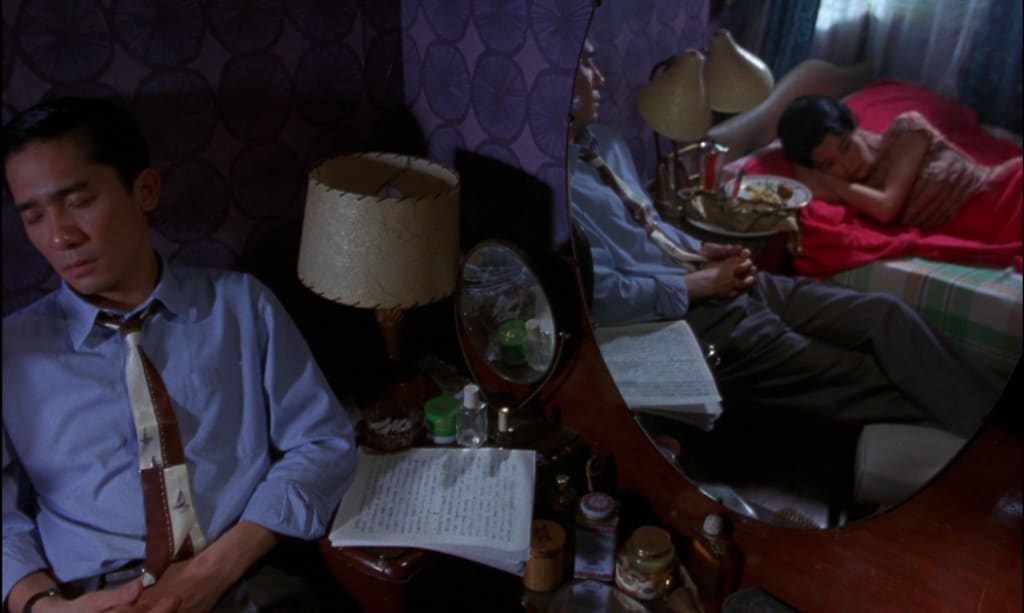
1 - It transcends material things and is not bound by human law
I watched Wong Kar-Wai’s beloved Hong Kong film like seven times and now I know more about love than you do. Byron and Pushkin and Austen are all dead so you may as well listen to me, I have credentials. My credentials are that I understand one of the best movies about love ever and I read a bunch of philosophy and sh*t, so pay attention. In the Mood for Love is about two lovers who meet while they are both in failing marriages. Mr. Chow and Mrs. Su Chan, the two main characters in the film, are each being cheated on by their respective spouses. They realize the truth over the long months that their respective husband and wife are gone for work. Once Su and Chow understand why their spouses are both gone at the same time and to the same place, they consult each other. They want to know why they were not enough, so they reenact the courtship of their spouses to find understanding. They go on dates, order food for each other and play out flirtations. Gradually, they develop very real feelings for one another. It’s a beautiful movie and you should go watch it. But first, finish reading my spoiler-free wisdom.
I should confess something first. This writer believes that love can be only one of two things: either a pleasant but illusory collision of neurons that our brains invented so we’d stick around long enough to take care of our children, or something divine and eternal, possibly the most powerful force in the universe, the animating energy of what has traditionally been called the “soul.” Something like that. There are several different kinds of love, but we will talk specifically about romantic love.
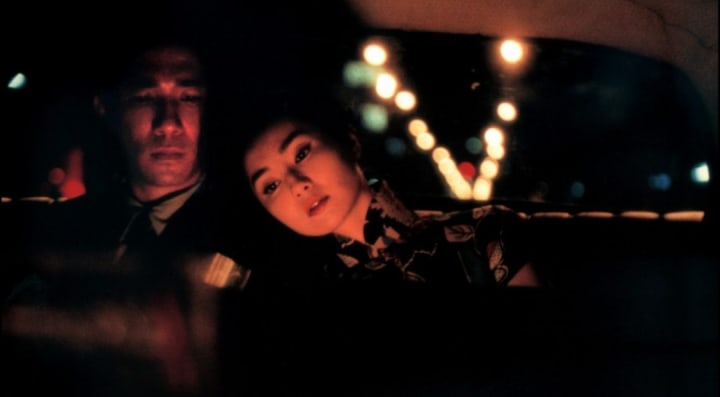
Let’s consider marriage, since Su and Chow are both married when they meet. Marriage is a very old social construction supposedly built around the notion of love, but it precedes the concept as we know it today. In its religious context, it is an attempt to unite two lovers by law. But all law is a construction subject to human flaws, and love is beyond these things or else it is a construction itself. To confine love to the domain of marriage is to limit it - but I’m not saying that cheating is okay if you think you’re in lerrrv with the head waitress or the pool guy. The reason Su and Chow’s love is actually real is because they are strong enough not to cheat. They set boundaries before they begin their own relationship: “We will not be like them,” they say - this also means that they will be unlike any other people on Earth. The synchronous meeting of souls (by the way I have a yoga class after this) accentuates each individual’s haecceity - that’s a fancy old philosophy word from John Duns Scotus. It means the particular and special quality that is unique to every human being: the Chowness of Chow and the Su-ness of Su.
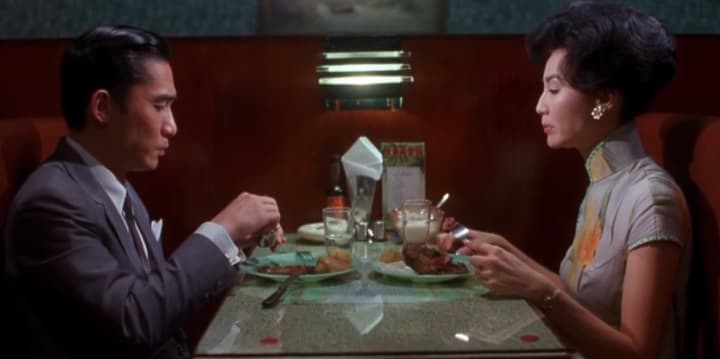
The space that Su and Chow occupy is confined by narrow walls, those odd human constructions that Wong Kar-Wai is so aware of. They live in a confined and gossipy atmosphere with infidelity and materialism surrounding them. Su’s own boss cheats on his wife, and he has her buy him gifts for both his mistress and his wife. Su and Chow have to go about meeting each other in secret, as though they are cheating - but they aren’t! We, the audience, see plenty of Su and Chow, but never see their respective spouses even though they appear in several scenes. Their faces are always turned away from the camera and we only see the reactions of Su and Chow to them. All the other characters in Mood are very concerned with material things like handbags, gambling and fancy rice-cookers, but Su and Chow are concerned only with each other and the wuxia serial they write together: their creative project.
The next level of the material is actually flesh. Chow’s friend Ping listens to Chow talk about love and replies classily, “I’d rather just get laid.” Chow takes a pensive drag from his cigarette and responds, “I’m not like you.” It’s not just about sex. Sex is the meeting of flesh, after all. This is not to degrade sex; sex is excellent. Love is bigger. Love can be expressed physically, but the expression is not the feeling itself. The feeling isn’t even love itself. The feeling is love becoming, entering the world through the faculty of what we have to call “emotion.” If love only exists in the brain, then it is only as “real” as we decide it is. It is as small as the part of the brain it was invented by. I’m sure you can already tell that I’m not talking about that. I think that love is something beyond us that we access. What I understand from Mood is that we access it by suffering with each other - not necessarily just by f*cking.
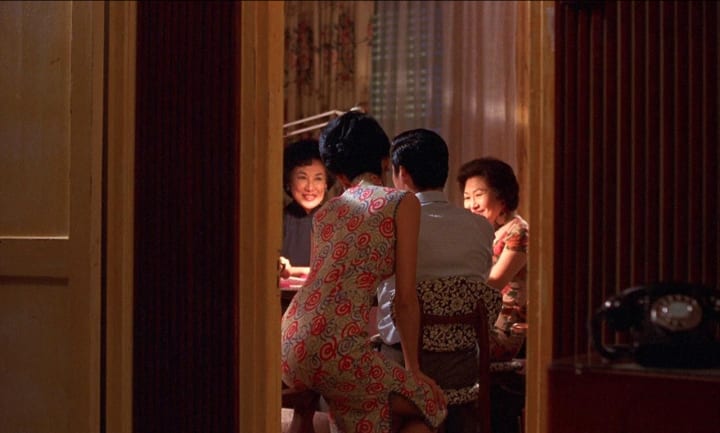
2 - It involves suffering together more than it involves sex
In a significant scene that is not a big spoiler, Su and Chow hold each other in the rain and tears mix with rain drops. Earlier in the film, Su cries in the shower - these are manufactured raindrops. It is significant that tears mix with rain water when two people are suffering together, and tears mix with shower water when one person suffers alone. If you are not there for someone when they are in pain, then you don’t love them - this seems pretty self-evident to me. Su and Chow hold each other inside the same pain of not being enough for their significant other. This compassion moves through all physical interaction. Hugging, holding, kissing someone - these are all expressions of something deeper, and they feel good because they communicate that expression. It is accessing love. Sex with someone you don’t particularly love is still fun, usually, but it would be way, way better if you really loved them. (Right? I mean, right?) The spark of love is first lit by attraction, certainly, but let’s consider that word: attraction. I assert that there is something beyond physical attraction, something even deeper than personality, because these elements of personhood are particular. Particularities must coalesce with universal, numinous qualities. They are threads spun from cosmic spools. Life’s most universal law is suffering (duhkha, in Buddhism.) To share in one another’s suffering unites people in spirit. This can only be done through the power of lerrrrrv.
So physical attraction is secondary. Most of us already know that subconsciously - it’s why we say that it’s what’s “inside” that counts. But do any of us really know what the hell that means? (Yes, me!) And if we do, do we follow our own rules? This writer finds it pretty difficult to ignore physical attraction. But attractive people are fairly common - substance of the soul is what’s uncommon and people who write about it are so annoying and pretentious. To believe that love is only something for the hotties on the magazine covers is to disbelieve in it because it relegates love to the physical realm, where it does not belong - if it does, then it is an illusion. It will expire, and it is all chance, rather than what is better called “fate.”
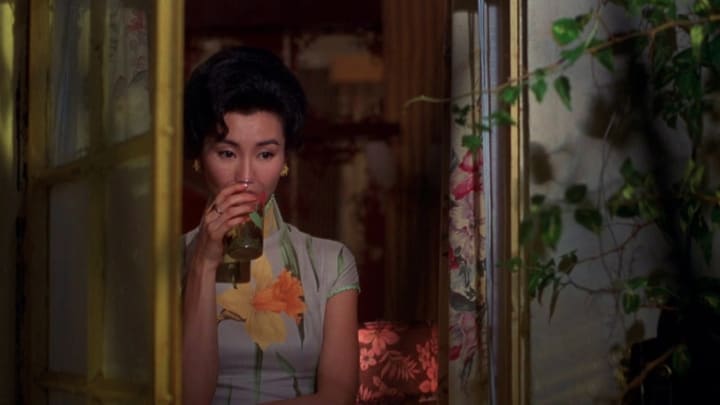
Su and Chow live next door to each other, so it is fate that brings both them together and their spouses together. But what those cheating losers have is relatively boring - it was pleasurable, sure, but only for like, twenty minutes. Then it was over and then it was forgotten. Su and Chow will remember each other for their whole lives. They will hold each other in the rain for the rest of their days. Their hands will shuffle nervously and touch just a second, for an eternity. It is because their romance is doomed that it will last forever. Sometimes true love is missed. But if it is missed, it is so only in this world, within the confines of time, space and human law.
In Mood there are many scenes of contemplation. Cigarette smoke wafting into electric lights and long stares into quiet patterns of fabric. The audience knows who Su and Chow are thinking of: each other. This is the same as a hand meeting another hand, but more spiritually significant. Thoughts for the other in moments of solitude are not really made in solitude. The thought of the beloved soars across space faster than light or sound or any physical interaction. Even a kiss is an appointment made in time. It’s scheduled and then almost immediately kept - or one person turns away and the other is stood up. Su and Chow do kiss… sort of. It’s a spiritual kiss. You’ll have to wait until the end of the essay to see how, or you can figure it out for yourself if you watch the movie and pay attention. But you know who has two middle fingers pointed at you and two thumbs pointed at himself and knows the secret already? This guy.
3 - It rests in the arms of eternity and it will find you if you really believe in it
If you’ve gotten this far, I will take it for granted that you believe, or at least suspect that love is not an illusion. In most religious traditions, love is considered to be something divine, and the divine is inextricably related to the eternal. Temporal things that begin and end are of this world, but the human creature is in two realms at once; we have a body that is of this world, but contained within that body is Spirit, a soul, a small part of what is divine and eternal. Or it’s all bullsh*t and this whole thing is just an accident - that could very well be the case. But that’s not what I’m writing about. Romantic love at its height is a connection between two sources of the same divine energy, two fragments of eternity. I know that doesn’t make sense, but let’s just say that it only appears not to because we are constrained by language as much as we are by time and space.
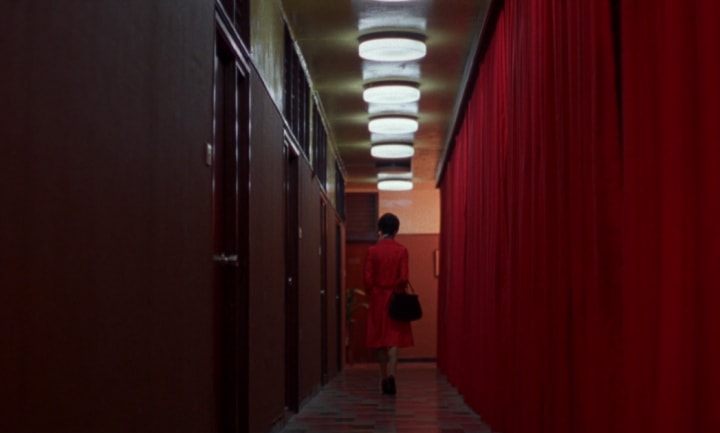
At an undisclosed point in Mood, Su and Chow become synchronized in time. I consider detailing the image to be a spoiler, but I assure you, it’s there. (Possibly in one of the images I chose to accompany this essay.) In this piece of time that is unstuck from all our measuring devices - like the Siemens clock present in several scenes in the film - Su and Chow have both thought of each other for the same reason and at the same moment. They have achieved a unity of rhythm in spirit. Spirit longs for connection, for the other half that it has been separated from (as famously discussed in Plato’s Symposium), but it is trapped in flesh and has to communicate through it: this is the whole difficulty. It can be so hard just to understand people. Even if you speak the same language, even if you’ve known each other for years - somehow, things still get misunderstood. Why is that? Of all the things that love describes, true and perfect Understanding might be at the core. So many words in English mean the same damn thing: compassion, sympathy, unity, solidarity - you get it, you know about words.
This is the paragraph where I tell you how Su and Chow kiss. I’m going to make this as spoiler-less as possible by describing the image of the kiss alone: it is the lipstick on a cigarette. Chow smokes, but Su doesn’t - or at least not as much as him. When Chow returns to his hotel room, he finds a bit of lipstick on his cigarette and he knows that Su has been there.The lipstick is their kiss, because it is the secretly held desire to kiss. The thought of a kiss, but a thought never - shall I say - consummated? So it remains a thought for the rest of Su and Chow, even as they move on with their lives. Because their relationship cannot begin, it also cannot end. Su and Chow refrain from kissing because they are in love. That is why love, in Mood is, precisely, to be In the Mood for love. To refrain from loving because it is not right; to be not like them. This is the irony of true love in a material world that hates love. To the extent that you relinquish the material, you gain love - every second that you’re on your phone instead of listening to your partner, love bleeds from open veins. Mood is a very tight movie - Chow and Su are always in small, constrained spaces. At the very end (I will not spoil this) the space becomes open, and spirit flows freely.
Love is just as cruel as it is beautiful, because it does not find everyone, but this is not for lack of trying - rather, it is because of material constraint. Love beats against the endless walls we erect. We keep it out. The most significant way we do this is by failing to believe in it. You can say that you believe in love without knowing a damn thing about what you mean. Do you think that love means a partner who will do everything for you? Do you think they will have to look this way, be this hot, this interesting, this wealthy, this submissive, this fun? They’ll probably be a few of those things, but don’t you see that by making a qualifying list, you admit that you don’t believe in love! You believe in dating. You associate love with physical and material constraints that don’t matter at all. All of it will fade. Money isn’t real. Bodies grow old and die and so do brains. A thousand nights of passion are not worth what Su and Chow have, because those thousand nights end. And then there are no more of them, and you’re back at zero. You were sort of at zero the whole time. Paradoxically, to believe in love is not to believe in something, because you don’t know what the something looks like. You’re only half the picture, and you don’t even know yourself all that well! The condition of life is to long for what is beyond it - what is not here, but past the very end.
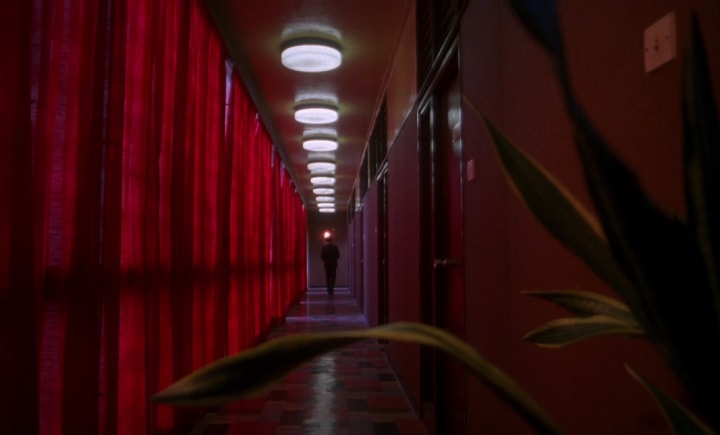

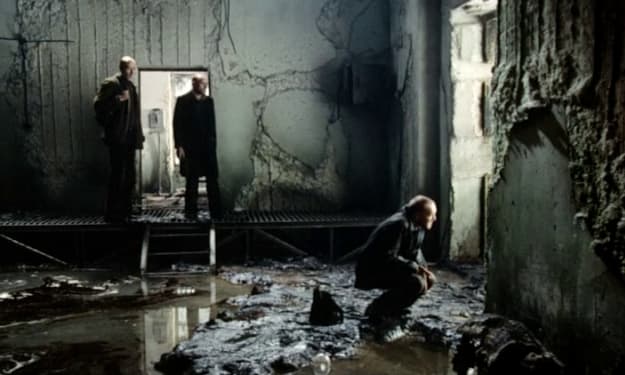



Comments
There are no comments for this story
Be the first to respond and start the conversation.